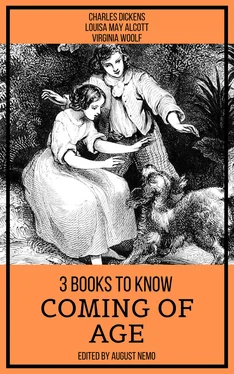I was, and I am, sensible that the air of this chamber, in its strong combination of stable with soup-stock, might have led one to infer that the coaching department was not doing well, and that the enterprising proprietor was boiling down the horses for the refreshment department. Yet the room was all in all to me, Estella being in it. I thought that with her I could have been happy there for life. (I was not at all happy there at the time, observe, and I knew it well.)
"Where are you going to, at Richmond?" I asked Estella.
"I am going to live," said she, "at a great expense, with a lady there, who has the power—or says she has—of taking me about, and introducing me, and showing people to me and showing me to people."
"I suppose you will be glad of variety and admiration?"
"Yes, I suppose so."
She answered so carelessly, that I said, "You speak of yourself as if you were some one else."
"Where did you learn how I speak of others? Come, come," said Estella, smiling delightfully, "you must not expect me to go to school to you; I must talk in my own way. How do you thrive with Mr. Pocket?"
"I live quite pleasantly there; at least—" It appeared to me that I was losing a chance.
"At least?" repeated Estella.
"As pleasantly as I could anywhere, away from you."
"You silly boy," said Estella, quite composedly, "how can you talk such nonsense? Your friend Mr. Matthew, I believe, is superior to the rest of his family?"
"Very superior indeed. He is nobody's enemy—"
"Don't add but his own," interposed Estella, "for I hate that class of man. But he really is disinterested, and above small jealousy and spite, I have heard?"
"I am sure I have every reason to say so."
"You have not every reason to say so of the rest of his people," said Estella, nodding at me with an expression of face that was at once grave and rallying, "for they beset Miss Havisham with reports and insinuations to your disadvantage. They watch you, misrepresent you, write letters about you (anonymous sometimes), and you are the torment and the occupation of their lives. You can scarcely realize to yourself the hatred those people feel for you."
"They do me no harm, I hope?"
Instead of answering, Estella burst out laughing. This was very singular to me, and I looked at her in considerable perplexity. When she left off—and she had not laughed languidly, but with real enjoyment—I said, in my diffident way with her:
"I hope I may suppose that you would not be amused if they did me any harm."
"No, no you may be sure of that," said Estella. "You may be certain that I laugh because they fail. Oh, those people with Miss Havisham, and the tortures they undergo!" She laughed again, and even now when she had told me why, her laughter was very singular to me, for I could not doubt its being genuine, and yet it seemed too much for the occasion. I thought there must really be something more here than I knew; she saw the thought in my mind, and answered it.
"It is not easy for even you." said Estella, "to know what satisfaction it gives me to see those people thwarted, or what an enjoyable sense of the ridiculous I have when they are made ridiculous. For you were not brought up in that strange house from a mere baby. I was. You had not your little wits sharpened by their intriguing against you, suppressed and defenceless, under the mask of sympathy and pity and what not that is soft and soothing. I had. You did not gradually open your round childish eyes wider and wider to the discovery of that impostor of a woman who calculates her stores of peace of mind for when she wakes up in the night. I did."
It was no laughing matter with Estella now, nor was she summoning these remembrances from any shallow place. I would not have been the cause of that look of hers, for all my expectations in a heap.
"Two things I can tell you," said Estella. "First, notwithstanding the proverb that constant dropping will wear away a stone, you may set your mind at rest that these people never will—never would, in hundred years—impair your ground with Miss Havisham, in any particular, great or small. Second, I am beholden to you as the cause of their being so busy and so mean in vain, and there is my hand upon it."
As she gave it me playfully—for her darker mood had been but momentary—I held it and put it to my lips. "You ridiculous boy," said Estella, "will you never take warning? Or do you kiss my hand in the same spirit in which I once let you kiss my cheek?"
"What spirit was that?" said I.
"I must think a moment A spirit of contempt for the fawners and plotters."
"If I say yes, may I kiss the cheek again?"
"You should have asked before you touched the hand. But, yes, if you like."
I leaned down, and her calm face was like a statue's. "Now," said Estella, gliding away the instant I touched her cheek, "you are to take care that I have some tea, and you are to take me to Richmond."
Her reverting to this tone as if our association were forced upon us and we were mere puppets, gave me pain; but everything in our intercourse did give me pain. Whatever her tone with me happened to be, I could put no trust in it, and build no hope on it; and yet I went on against trust and against hope. Why repeat it a thousand times? So it always was.
I rang for the tea, and the waiter, reappearing with his magic clue, brought in by degrees some fifty adjuncts to that refreshment but of tea not a glimpse. A teaboard, cups and saucers, plates, knives and forks (including carvers), spoons (various), saltcellars, a meek little muffin confined with the utmost precaution under a strong iron cover, Moses in the bullrushes typified by a soft bit of butter in a quantity of parsley, a pale loaf with a powdered head, two proof impressions of the bars of the kitchen fire-place on triangular bits of bread, and ultimately a fat family urn: which the waiter staggered in with, expressing in his countenance burden and suffering. After a prolonged absence at this stage of the entertainment, he at length came back with a casket of precious appearance containing twigs. These I steeped in hot water, and so from the whole of these appliances extracted one cup of I don't know what, for Estella.
The bill paid, and the waiter remembered, and the ostler not forgotten, and the chambermaid taken into consideration—in a word, the whole house bribed into a state of contempt and animosity, and Estella's purse much lightened—we got into our post-coach and drove away. Turning into Cheapside and rattling up Newgate-street, we were soon under the walls of which I was so ashamed.
"What place is that?" Estella asked me.
I made a foolish pretence of not at first recognizing it, and then told her. As she looked at it, and drew in her head again, murmuring "Wretches!" I would not have confessed to my visit for any consideration.
"Mr. Jaggers," said I, by way of putting it neatly on somebody else, "has the reputation of being more in the secrets of that dismal place than any man in London."
"He is more in the secrets of every place, I think," said Estella, in a low voice.
"You have been accustomed to see him often, I suppose?"
"I have been accustomed to see him at uncertain intervals, ever since I can remember. But I know him no better now, than I did before I could speak plainly. What is your own experience of him? Do you advance with him?"
"Once habituated to his distrustful manner," said I, "I have done very well."
"Are you intimate?"
"I have dined with him at his private house."
"I fancy," said Estella, shrinking "that must be a curious place."
"It is a curious place."
I should have been chary of discussing my guardian too freely even with her; but I should have gone on with the subject so far as to describe the dinner in Gerrard-street, if we had not then come into a sudden glare of gas. It seemed, while it lasted, to be all alight and alive with that inexplicable feeling I had had before; and when we were out of it, I was as much dazed for a few moments as if I had been in Lightning.
Читать дальше












